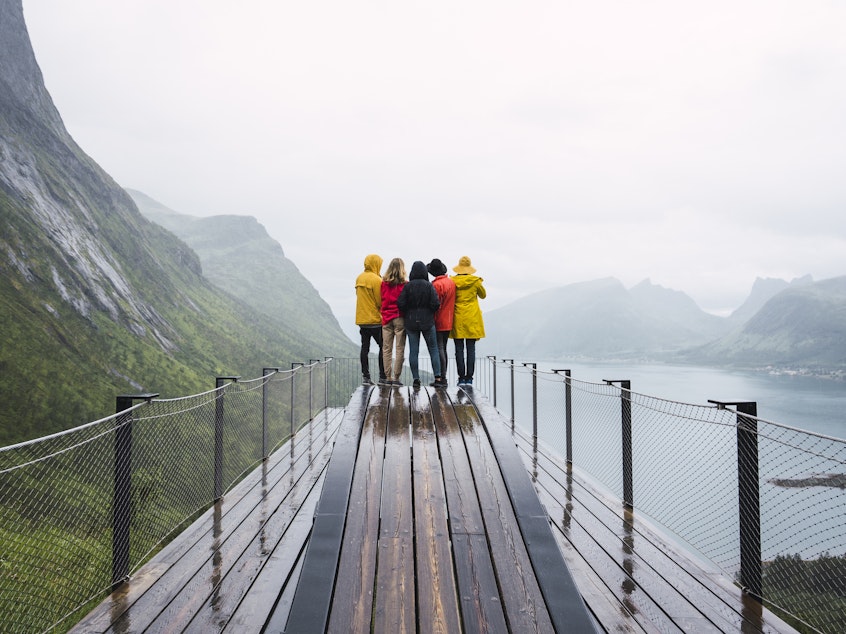7 tips to help you keep the peace when traveling with a group

Going away together — as a couple or in a group — sounds exciting, but the cocktail of travel's inherent stresses and a group's personality differences can sometimes combust. There are ways, however, to have a good time and deepen your connections. We mined conflict coaches, therapists and group tour guides for their top tips on navigating the social dynamics of traveling together.
1. Align your expectations ahead of time.
Agree on the why of the trip, and then go from there. "Have a fun conversation over a meal about what you want this trip to be," says Priya Parker, a conflict counselor and the author of The Art of Gathering: How We Meet and Why It Matters.
Ask yourselves, why are we going on this trip? To relax or to work? To learn about history, to reunite a family, to conquer a physical challenge? Talk about the goal and intentions.
Sponsored
Call it what you want — pre-trip counseling, setting up a social contract, level setting — this is all about anticipating potential issues in advance. "One of the core elements of conflict resolution is you imagine future problematic scenarios, and you ask people about them ahead of time," says Parker.
One often-overlooked issue is how the group will make decisions.
"You can decide based on consensus," Parker says. " 'We'll go with however the most tired person is feeling.' Or, 'We'll go with whoever is willing to foot the bill for everybody else.' You can be playful around these decisions." Having a template decided in advance can stave off issues while traveling.
2. Set boundaries for how you'll spend your time.
Sponsored
If you're an introvert, plan to carve out your me time, so the trip doesn't become overwhelming and miserable.
"I always do this," says psychotherapist and self-described introvert Lisa Kays. "I look at, like, how much group time? Where do I get my alone time? Figure out [in advance] what are the things I'd want to do alone, and if I am traveling with somebody, letting them know that. It's not personal at all. This is something I'd be doing even if I was hanging out with my favorite celebrity."
It can be easy to get caught up in people pleasing and being polite, says Kays, but if you're not getting what you need, things can start to deteriorate. You'll be a better travel companion if you're rested and recharged.
3. Have a mix of scheduled days and unscheduled days.
Sponsored
Some travelers like to plan every moment; others are more spontaneous and want to see where the mood takes them. Having a mix helps balance out a trip. "If you're going on a five-day trip, saying look, we're gonna have two days of downtime, or two days where it's unscheduled, but then let the planners do their thing!" Kays says.
4. Don't forget your grown-up lovey.
"I think that we can underestimate sometimes the stress that goes on when we're traveling," says Kays. "Even if you're having a great time, it is a bit of an assault on your body and your mind."
Bring something from your home routine to help you stay sane on the road — anything from a song you like to hear to a few yoga poses you always do in the morning.
Sponsored
Ask yourself, "What's my transitional object that I could take with me, to make myself feel better," Kays says. "And how can you bring it with you so that you don't lose touch with your at-home self."
5. Confront any social issues that arise head-on, with honesty.
Don't avoid conflict in order to be polite, and don't let "unhealthy peace" fester.
"Unhealthy peace is peace that's not really peace," says Parker. "It's where ... if a stranger was looking at you, the stranger would think, 'oh, everything's fine here. They seem to be enjoying themselves. Everybody's kind and polite, and this looks like a really great group.' But underneath, everybody's simmering and seething."
Sponsored
Defuse tension by talking out any social issues honestly.
"The deepest element of conflict resolution is an invitation to make the implicit explicit," Parker says. When there's unhealthy peace, usually everyone in the group can recognize it's there. So be unafraid to bring it up. Maybe by cracking a joke, or just asking to do a check-in to see how everyone's feeling.
"I know that groups recover better and can deal when somebody says, like, guys, is something weird?" says Kays. "Usually everybody's like, 'Oh, thank God, somebody said it.' "
6. Couples drama doesn't get to dominate the group dynamic.
We all love love, and people fall in love while traveling. People get into cliques, too. If pairs or triads break out, maintain an inclusive group with a rule: Your romantic drama doesn't get to dominate the dynamic.
"You can certainly encourage some norms and behaviors and expectations around how it gets dealt with in the group because it can be annoying," Kays says.
If drama does arise, Kays suggests asking the people involved to discuss it with a friend who isn't on the trip over the phone so that gossip doesn't impact the group dynamics.
7. Be friends enough to forgive.
"Generally conflict tends to get more awkward the longer it goes on," says Kays. So try to address conflict when it arises. "It's a brave thing to do. It's a hard thing to do," she says.
Then you can focus on making the kind of memories you'll look back on fondly.



